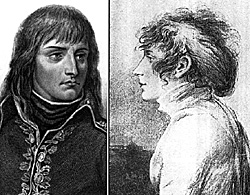
Not many women in history are known to the world by their first name. Say "Josephine" and most people know who you are talking about. Yet she was not known by that name until quite late in her life. She was born Rose, in 1763, on the Caribbean island of Martinique. Poorly educated, of impoverished nobility, it was likely seen as a joke when (it is said, and likely even true) a fortuneteller predicted she would be unhappily married, become widowed, and then become "more than a queen" -- all of which ,in fact, came to pass.
At sixteen, Rose sailed to France to wed young, wealthy Alexandre de Beauharnais, by whom she had two children. It was an unhappy marriage. Alexandre was a lady's man, and together with his mistress accused Rose of infidelity and banished her to a convent.
Rose's life as a single mother had modern tones: she struggled to collect alimony; she moved in with relatives to make ends meet; she fought for the return of her son after Alexandre kidnapped him.
It was a time of great turmoil and great idealism. Alexandre became a passionate leader of the Revolution. Nevertheless, as an aristocrat, he was, in time, arrested, and, shortly after, Rose was arrested as well. After Alexandre was beheaded, Rose's fate was sealed...but the day she was to be executed, Robespierre was beheaded and the Terror abruptly ended. She would live to meet and marry a penniless Corsican general with an unpronounceable name: Napoleone Buonaparte.
He named her Jose-phine. He crowned himself Emperor, and crowned her Empress. He loved her with a passion, and she, in time, came to return his love with an almost obsessive devotion. Together they had one of the great marriages in history, but it was not without raging battles, squabbles over money, infidelities, heart-breaking tragedies and the stress of incessant assassination attempts and constant battle (political, military, and familial -- hers were the "in-laws from hell"). But in spite of all that, there was always a partnership, always a bond. Josephine, in her quiet way, was essential to Napoleon.
Their divorce, a political necessity forced upon Napoleon by her infertility (the stress of prison had brought on an early menopause), happened to coincide with the beginning of the end of the great Napoleonic Empire. She died heartbroken in the spring of 1814, shortly after Napoleon's defeat and first exile. Her dying words were of Napoleon, and his, seven years later, were of her.
More Napoleon: Introductory Guide
-
Introduction
Prejudice and Pride
Napoleon in Military School
The Young Artillerist's Double Life
Revolution & Opportunity
Women's Fashion During the Revolution
The Siege of Toulon
Napoleon & Josephine
Women's Fashion during the Directory
Fame & Glory: Italy
Fame & Glory: Egypt
Saviour or Usurper
Battle of Marengo
Civil Achievments
Enlightened Despot or Tyrant
Napoleon's Siblings
The Dawn of Gastronomy
Haydn and Beethoven
Women's Fashion during the Empire
Napoleon's Other Women
The Mashalate and Imperial Eagle
History's Greatest General?
Back to Table of Contents -- Napoleon #17
Back to Napoleon List of Issues
Back to MagWeb Master Magazine List
© Copyright 2001 by Napoleon LLC.
This article appears in MagWeb (Magazine Web) on the Internet World Wide Web.
The full text and graphics from other military history magazines and gaming magazines are available at http://www.magweb.com
Order Napoleon magazine direct